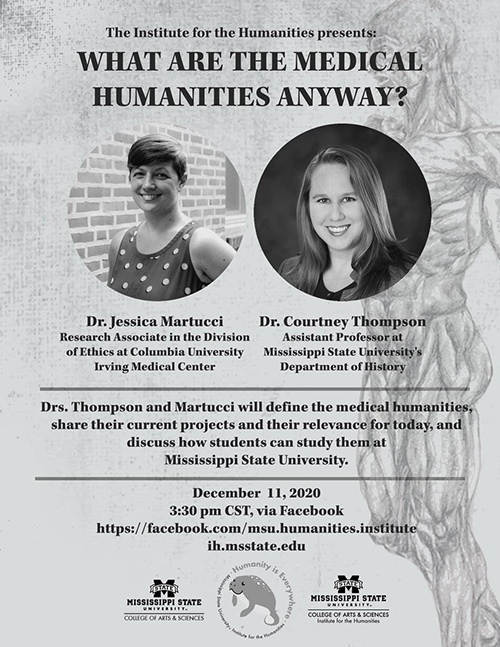Exploration of ‘medical humanities’ topic of upcoming online presentation
Contact: John Burrow
 STARKVILLE, Miss.—Mississippi State University’s Institute for the Humanities is hosting an online final event for this semester, featuring experts in the medical humanities for a discussion on this interdisciplinary field.
STARKVILLE, Miss.—Mississippi State University’s Institute for the Humanities is hosting an online final event for this semester, featuring experts in the medical humanities for a discussion on this interdisciplinary field.
Courtney Thompson, assistant professor in MSU’s Department of History, and Jessica Martucci, research associate in the Division of Ethics at Columbia University Irving Medical Center, will provide insight on the discipline that combines humanities, social sciences and the arts into conversation with biomedicine. The virtual program aims to demonstrate the influence of humanities on medicine in the past and present.
The Dec. 11, 3:30 p.m. CST event on the institute’s Facebook page is open to the public and hosted by Julia Osman, director of the Institute for the Humanities and an MSU associate professor of history.
“I am looking forward to learning about what affects our understanding of health and how the sciences are humanistically driven,” Osman said.
Thompson, a historian of medicine who teaches pre-med students, said she believes the humanities “offer new ways for future health professionals to think about medicine, disease and their relationships with their patients.”
Last year, Thompson helped organize a medical humanities certificate program at MSU and said the field is intended “to expand and support the training of medical professionals by helping them to access multiple perspectives on health, healing and the body.”
“Medical humanities is intended to provide future and current medical practitioners with a broader complement of analytical tools for understanding their practice and profession,” said Thompson, who specializes in the history of 19th-century American medicine.
Thompson said the assumption that the humanities is “fundamentally at odds” with the sciences—or that the humanities has little to offer to STEM fields—is a “contemporary assumption.”
“In the 19th century, for example, physicians were expected to be well-read and to have studied literature, the arts and languages, especially Latin and classical texts,” Thompson said.
The separation of STEM from the humanities served “to create an artificial division between these fields that had not existed through most of the history of medical education,” she said.
During the Facebook Live event, Thompson hopes participants understand the “assumptions about the strict division between the humanities and the sciences is artificial and impedes broader understanding of the work of medicine.”
“Many of the qualities we admire in physicians and other health care professionals—their compassion and care, and the connections they forge with their patients—are not lessons drawn from STEM and the basic sciences, but come through humanistic inquiry, from literature and the arts, and from ethics,” Thompson said.
As part of MSU’s College of Arts and Sciences, the Institute for the Humanities promotes research, scholarship and creative performances in the humanistic disciplines and raises their visibility, both within Mississippi State University and the wider community. The institute is active on social media on Instagram @msstatehumanities, Twitter @Humanities_MSU and Facebook @msu.humanities.institute.
MSU’s College of Arts and Sciences includes more than 5,200 students, 323 full-time faculty members, nine doctoral programs, 14 master’s programs, and 27 undergraduate academic majors offered in 14 departments. It also is home to the most diverse units for research and scholarly activities, including natural and physical sciences, social and behavioral sciences, and the humanities. For more about the College of Arts and Sciences or the Institute for the Humanities visit www.cas.msstate.edu or www.ih.msstate.edu.
MSU is Mississippi’s leading university, available online at www.msstate.edu.